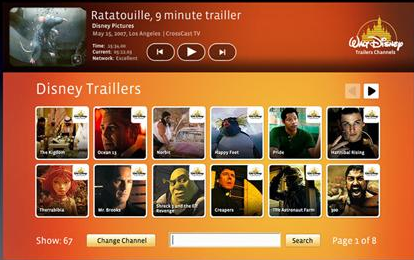It was heralded as re-inventing the TV paradigm or the end of TV as we know it, yet barely a year after its public launch, online video service Joost appears to be lurching from one crisis into another. The service is planning a major retrenchment, reports the UK’s Sunday Times newspaper, “after failing to attract enough users and top-flight broadcasting rights.”
Joost was the one service guaranteed to get the digerati foaming at the mouth, with the kind of gushing enthusiasm normally reserved for the latest Apple gizmo. The company struck gold early in its history by opportunistically inking a content deal with Viacom – some speculated it was less about Viacom making a serious push into the brave new world of web video and more one-in-the-eye at YouTube, which it is currently suing for alleged copyright infringement.
The online video market has evolved considerably during the last year – most if not all of the big broadcast networks have launched or beefed up their offers: NBC Universal and NewsCorp. have bowed their “YouTube-killer” portal Hulu; the BBC iPlayer eventually made its debut and ‘Project Kangaroo’, the JV between the BBC, ITV and Channel 4 looks set to create a new online video powerhouse later this year.
Meanwhile Joost, requiring users to download and install a desktop application, populated with pedestrian content, is in danger of looking as cutting edge as a parent at a school disco. Moreover, at a time when play now Flash streaming has become the de facto user experience, Joost feels clunky by comparison. True, Apple’s iTunes also requires users to install a desktop app, but it does boast some heavyweights as content partners.
It’s a cruel twist of irony that the ‘revolutionary’ service which looked set to shake up the TV paradigm is in danger of looking so web 1.0 at a time when video is so seamlessly being woven into the fabric of the rest of the web. Joost is retrenching from global markets to focus on the U.S., says The Sunday Times – something it probably should’ve done in the first place.
Moral of the tale #1 is that striking gold very seldom happens more than once in succession – something the entertainent industry understands well. Joost’s founders Niklas Zennström and Janus Friis may have turned the telecoms industry upside down with Skype, but thus far Joost has failed to establish itself as anything more than an over-hyped vanity business.
Moral of the tale #2 is under-estimate the deeply-entrenched business models of media and entertainment incumbents at your peril.
The future for Joost? Renewed focus on the U.S. will likely help the service to leverage its strengths and build a significant niche market. Eventually its founders will tire of it and likely offload it to a media heavyweight. beyondnessofthings predicts Viacom will buy it at fire auction rates.
Update: Joost has rebutted yesterday’s story in The Times, telling paidContent‘s Rafat Ali that it’s not planning any major layoffs, though it is doing a “re-alignment” (not to be interepreted as a sole focus on the U.S. market). beyondnessofthings accepts that Joost may not be refocusing its activity to the extent outlined in the Sunday Times report, but stands by the comments stated above.




